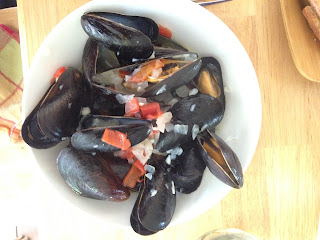Seafood...its what's for dinner! Mussels are a great value ($3.99/lb; 1 lb per person for a main meal is plenty) and nutritious, especially for feeding the brain with Vitamin B12, DHA and EPA (Omega-3 Fats), Selenium, Vitamin C and protein.
A healthy brain needs Omega-3 Fats found in seafood. Some Omega 3's (ALA) are found in greens, flax seeds, and chia seeds but the benefits from the type in seafood are better absorbed by the body and greater than plant-based to prevent depression, dementia, and heart disease.
Vitamin B12 is found only in animals and seafood; and is a common deficiency in those that are vegan or vegetarian. Low levels of B12 can cause irreversible brain damage and deficiencies cause depression and anemia.
Selenium is a powerful antioxidant and is needed for metabolism and thyroid function.
Check out Drew Ramsey's book
Eat Complete for detailed information about these vitamins and for the mussels recipe.
Kale! I love kale! I eat it sauteed, raw, grilled, and crispy from the oven. Kale, a cruciferous veggie is full of nutritional benefits. And, spring kale from a local organic farm is sweet and tender. Kale contains a large dose of Vitamin K, Vitamin C and Vitamin A and many trace minerals. Kale supports brain and bone health, cardiac health, and supports the immune system.
Here's my kale Caesar salad recipe:
1 bunch kale, washed and leaves pulled from stems and torn
1 head of romaine, washed and leaves torn
Dressing:
4-6 anchovies
4 cloves garlic
1 tsp. dry mustard
1 tablespoon Worcestershire sauce
3 tablespoons lemon juice
3 tablespoons plain yogurt
1/2 cup olive oil
Parmesan cheese
Blend first 6 ingredients in a jar using an immersion blender (or small food processor) until garlic and anchovies blended. Add in olive oil and blend.
Mix dressing (not all will be needed) and greens and add Parmesan cheese.



